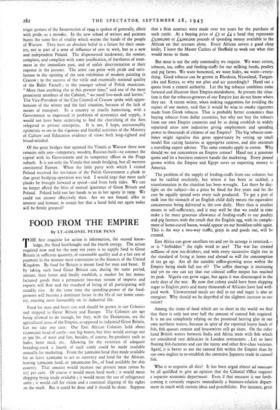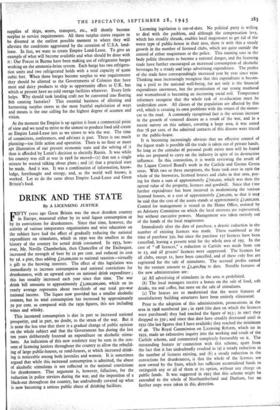FOOD FROM THE EMPIRE
By LT.-COLONEL PETER PENN
THE first requisite for action is information, the second know- ledge, the third forethought and the fourth energy. The action required now and for the next ten years is to supply food to Great Britain in sufficient quantity, of reasonable quality and at a fair rate of payment in the manner most convenient to the finances of the United Kingdom. By food for Britain is meant food for man and beast. If by taking such food Great Britain can, during the same period, initiate, then foster and finally establish, a market for her manu- factured goods then a permanent two-way stream of imports and exports will flow and the standard of living of all participating will steadily rise. At the same time the spending-power of the food- growers will become a dominant factor in the life of our home coun- try, reacting most favourably on its industrial life.
Food for man and beast can and should be grown in our Colonies and shipped to Great Britain and Europe. The Colonies are npt being allowed to do enough, for they, with the Dominions, are the agricultural areas of the Empire, as opposed to industrial' Great Britain. Let me take one case. Our East African Colonies hold about 12,000,000 head of cattle—not big beasts, but they would average out at 300 lbs. of meat and fats, besides, of course, by-products such as hides, bone meal, etc. Allowing for the retention of adequate breeding-stock a fourth of such cattle could be made available annually for marketing. From the 3,000,000 head thus made available for us leave 2,000,000 to act as currency and food for the African, leaving i,000,000 head, or 300,000,000 lbs., of food available for this country. That amount would increase our present meat ration by 12} per cent. Of course it would mean hard work ; it would mean shipping being made available ; it would mean the use of refrigerator units ; it would call for vision and a continual aligning of the sights on the mark. But it could be done and it should be-done. Suppose
that a firm contract were made over ten years for the purchase of such cattle. At a buying price of £3 or £4 a head that represents £3,000,000 or £4,000,000 pounds of spending money available to the African on that account alone. Every African covets a good clasp knife; I leave the Master Cutlers of Sheffield to work out what that would mean to them.
But meat is not the only commodity we require. We want cotton, tobacco, tea, coffee and feeding-stuffs for our milking herds, poultry and pig farms. We want bonemeal, we want hides, we want—every- thing. Good tobacco can be grown in Rhodesia, Nyasaland, Tangan- yika and Kenya, so why not plan and act accordingly? Hand out a quota from a central authority. Let the big tobacco combines come forward and illustrate their Empire-mindedness. At present the situa- tion is that the tobacco-growers of our Empire just do not know where they are. A recent writer, when making suggestions for avoiding the export of our money, said that it would be wise to smoke cigarettes made from Greek tobacco. - That is probably better economics than buying tobacco from dollar countries, but why not buy the tobacco from our own Empire countries and by so doing establish in widely separated areas new industries giving employment and spending power to thousands of citizens of our Empire? The big tobacco com- bines might signalise this great opportunity by setting up small model flue curing factories at approprite centres, and also maintain a travelling expert adviser. The same remarks apply to cotton. Why should we not concentrate on Empire cotton? Hand out a generous quota and let a business concern handle the marketing. Every pound grown within the Empire and Egypt saves us exporting money to America.
The problem of the supply of feeding-stuffs from our colonies has not be tackled resolutely, but where it has been so tackled, a transformation in the situation has been wrought. Let there be day- light on the subject—let a price be fixed for five years and let the cost be equally spread over every sack produced. To get a pint of milk into the stomach of an English child daily means the equivalent concentrates being delivered to the cow daily. Here then is another means to self-sufficiency, and it may well be that we could in time make a far more generous allowance of feeding-stuffs to our poultry and pig farmers with the result that the English egg, with its comple- • ment of home-cured bacon, would appear on our breakfast-table again. This is the way a two-way traffic, grain in and goods out, will be created.
East Africa can grow excellent tea and yet its acreage is restriced,— or is " forbidden " the right word to use? The war has created millions of new tea-drinkers, and with every successive slight rise in the standard of living at home and abroad so will the consumption of tea go up. Are all the suitable coffee-growing areas within the Empire being made full use of? The coffee shortage is increasing and yet no one can say that our colonial coffee output has reached its peak. Nigeria can grow sugar, but again it was discouraged in the early days of the war. By now that colony could have been shipping sugar to English ports and many thousands of Africans have had well- paid work. Unsweetened meals are dull to eat and sugar is also an energiser. Why should we be deprided of the slightest increase to our ration?
Among the items of food which are so short in the world we find that there is only just over half the amount of canned fish required. It is no use completely relying on the promised herring glut in our own northern waters, because in spite of the reported heavy hauls of fish, fish. queues remain and housewives still go short. On the other hand British waters between India and Africa teem with fish which are considered rare delicacies in London restaurants. . Let us have floating fish-factories and can the ninny and other first-class varieties. Agairf, it is better to use the canned fish within the Empire than by our own rieglect to re-establish the extensive Japanese trade in canned fish.
Who is to organise all this? It has been urged almost ad nauseam by all qualified to give an opinion that the Colonial Office requires a separate economic department. Even if that measure is not forth- coming it certainly requires immediately a business-relation depart- ment in touch with current ideas and possibilities. For instance, great supplies of ships, stores, transport, etc., will shortly become surplus to service requirements. All these surplus stores require to be diverted at the earliest possible moment to where they will alleviate the conditions aggravated by the cessation of U.SA. lend- lease. In fact, we want to create Empire Lend-Lease. To give an example of what will become available and what should be done with it : Our Forces in Burma have been making use of refrigerator barges working on the ammonia-brine system. Each barge has two refrigera- tion units and two refrigerated holds with a total capacity of 9,000 cubic feet. When these barges become surplus to war requirements they should be allotted to the Governments of Colonies that have meat and dairy products to ship as opportunity offers to U.K. but which at present have no cold storage facilities whatever. Every little helps. Why should tank landing craft not be converted into floating fish canning factories? This essential business of allotting and harnessing surplus stores to the most fruitful exploitation of ways and means is the one calling for the highest degree of acumen and vision.
At the moment the Empire is up against it from a commercial point of view and we need to strive to the utmost to produce food and create an Empire Lend-Lease just as we strove to win the war. The time of committees, conferences, and advisers is past. There is too much planning—too little action and operation. There is no finer or more apt illustration of our present economic state and the solving of it than is afforded by Lenin's decision to electrify Russia. It was while his country was still at war in 1918 he moved—(t) that not a single minute be wasted talking about plans ; and (2) that a practical start be made. And it was. It was a combination of information, know- ledge, forethought and energy, and, as the world well knows, it worked. Let us do the same about Empire Lend-Lease and Great Britain's food.



























 Previous page
Previous page